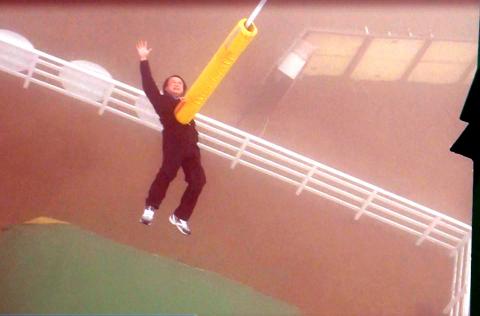Democratic Progressive Party (DPP) Taipei City Councilor Wang Shih-cheng (王世堅) leapt from a 30m high platform in Japan earlier this month as he carried out his promise to bungee jump after losing a bet over who would win the Jan. 14 presidential election.
During an interview with a local radio talk show last year, Wang said he would do a bungee jump if then-DPP chairperson Tsai Ing-wen (蔡英文) lost the Jan. 14 presidential election to President Ma Ying-jeou (馬英九).
On March 6, Wang performed the bungee jump on the platform at a farm in Chiba County, Japan, and posted the video clip on his Facebook page on Monday to prove he kept his promise.

Photo: Liu Jung, Taipei Times, from on-line video
“I am a politician who keeps my promises, and I want to set an example for other politicians that we are responsible for what we say,” he said.
Wang said he had planned to carry out his promise by leaping from a bridge in New Taipei City (新北市), but the city government turned down his application due to public security concerns, and he later decided to do the jump in Japan.
In the video clip, Wang shouted: “A promise is a promise,” before leaping from the platform in heavy rain.
“It was so cold that day, and I felt dizzy during the fall … Just like me, the DPP also experienced a terrible fall to the ground, but we will eventually bounce back,” he said.
The bungee jump was not the first promise Wang carried out after a bet. In 2008, as a DPP legislator, Wang dared he would jump into the sea at Chienshuiwan (淺水灣) if all eight of the Chinese Nationalist Party’s (KMT) legislative candidates were elected in Taipei constituencies.
Riding a jet ski about 100m offshore, Wang plunged into the waters, although he was ridiculed by some netizens who said that it looked as if he fell into the water rather than jumped.
Wang on Monday said he would continue to make similar bets that the DPP would obtain election victories.

Alain Robert, known as the "French Spider-Man," praised Alex Honnold as exceptionally well-prepared after the US climber completed a free solo ascent of Taipei 101 yesterday. Robert said Honnold's ascent of the 508m-tall skyscraper in just more than one-and-a-half hours without using safety ropes or equipment was a remarkable achievement. "This is my life," he said in an interview conducted in French, adding that he liked the feeling of being "on the edge of danger." The 63-year-old Frenchman climbed Taipei 101 using ropes in December 2004, taking about four hours to reach the top. On a one-to-10 scale of difficulty, Robert said Taipei 101

Nipah virus infection is to be officially listed as a category 5 notifiable infectious disease in Taiwan in March, while clinical treatment guidelines are being formulated, the Centers for Disease Control (CDC) said yesterday. With Nipah infections being reported in other countries and considering its relatively high fatality rate, the centers on Jan. 16 announced that it would be listed as a notifiable infectious disease to bolster the nation’s systematic early warning system and increase public awareness, the CDC said. Bangladesh reported four fatal cases last year in separate districts, with three linked to raw date palm sap consumption, CDC Epidemic Intelligence

US climber Alex Honnold left Taiwan this morning a day after completing a free-solo ascent of Taipei 101, a feat that drew cheers from onlookers and gained widespread international attention. Honnold yesterday scaled the 101-story skyscraper without a rope or safety harness. The climb — the highest urban free-solo ascent ever attempted — took just more than 90 minutes and was streamed live on Netflix. It was covered by major international news outlets including CNN, the New York Times, the Guardian and the Wall Street Journal. As Honnold prepared to leave Taiwan today, he attracted a crowd when he and his wife, Sanni,

Taiwanese and US defense groups are collaborating to introduce deployable, semi-autonomous manufacturing systems for drones and components in a boost to the nation’s supply chain resilience. Taiwan’s G-Tech Optroelectronics Corp subsidiary GTOC and the US’ Aerkomm Inc on Friday announced an agreement with fellow US-based Firestorm Lab to adopt the latter’s xCell, a technology featuring 3D printers fitted in 6.1m container units. The systems enable aerial platforms and parts to be produced in high volumes from dispersed nodes capable of rapid redeployment, to minimize the risk of enemy strikes and to meet field requirements, they said. Firestorm chief technology officer Ian Muceus said